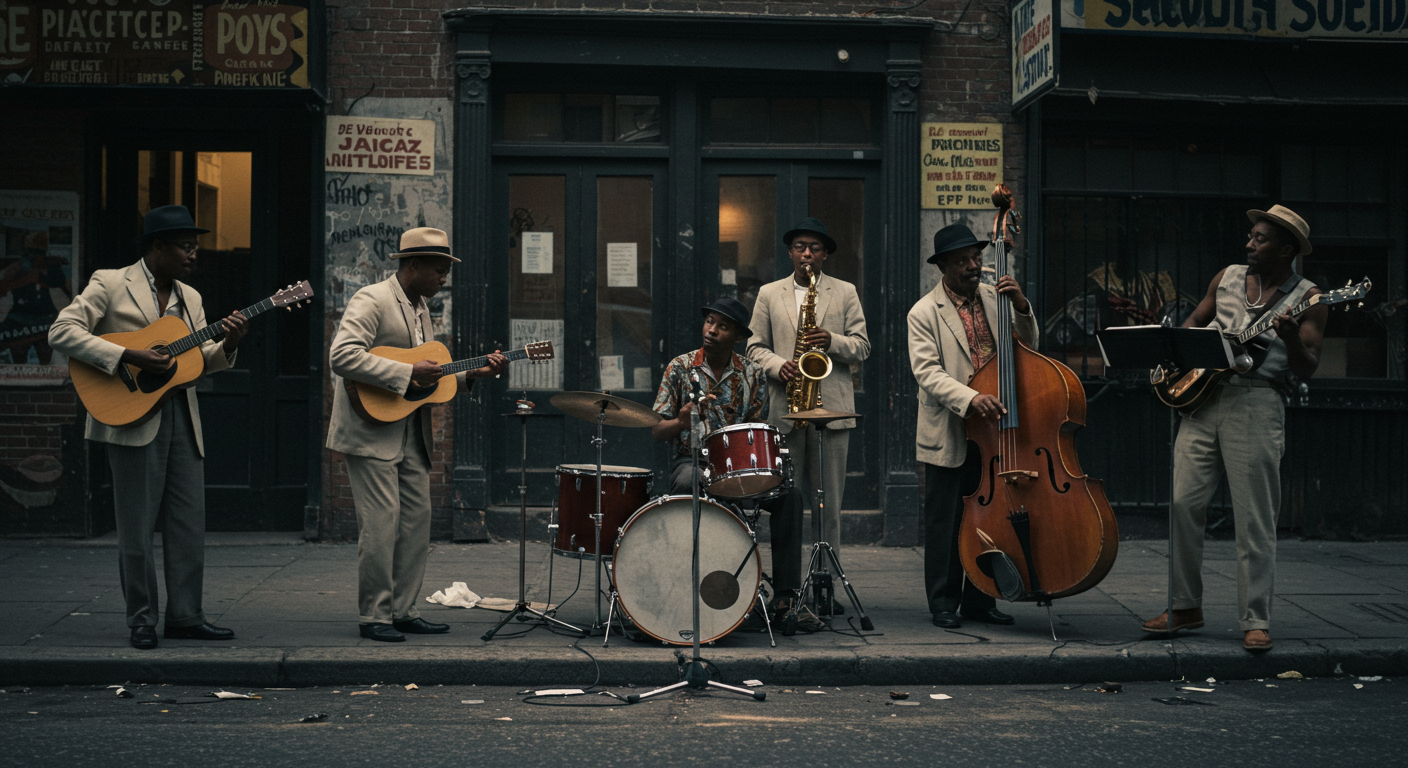Afro Jazz is not just a genre—it’s a feeling. A swirling dance between improvisation and rhythm, tradition and innovation. It’s the horn of a saxophone echoing through the streets of Soweto, the soft pulse of drums in Dakar, and the delicate plucking of a kora string under a twilight sky in Bamako.
Born from a marriage between American jazz and African musical traditions, Afro Jazz has grown into one of the most soulful and dynamic sounds on the continent—and beyond. This article explores its roots, evolution, key artists, and how it continues to shape Africa’s musical identity.
The Origins: Jazz Crosses the Atlantic
Jazz originated in the African-American communities of New Orleans in the early 20th century, heavily influenced by African rhythms, spirituals, and blues. When jazz made its way back across the Atlantic to Africa in the mid-20th century—via radio, LPs, and returning African-American soldiers—it resonated like a long-lost relative returning home.
Musicians across Africa began blending jazz with local instruments, folk melodies, and indigenous rhythms. The result was Afro Jazz: bold, spiritual, and rooted in African soil.
Pioneers of Afro Jazz: Voices of a New Sound
In the 1950s and 60s, Afro Jazz blossomed as artists used the genre to push musical boundaries and protest colonialism and apartheid.
🎷 Hugh Masekela (South Africa)
A legendary trumpeter who fused township music, jazz, and political activism. Songs like Stimela and Grazing in the Grass became anthems of resistance and cultural pride.
🎷 Manu Dibango (Cameroon)
Best known for Soul Makossa, Dibango brought saxophone-driven jazz to the dancefloor, blending Makossa rhythms with funk and soul.
🎷 Mulatu Astatke (Ethiopia)
Father of Ethio-jazz, Astatke studied music in London and New York, then returned to Ethiopia to create a mesmerizing blend of jazz and traditional Ethiopian scales.
These pioneers didn’t just play jazz—they Africanized it, creating something new, grounded in homegrown identity.
Afro Jazz Across Regions
Afro Jazz is not monolithic; it morphs depending on the region:
- South Africa: Known for Cape Jazz (Abdullah Ibrahim) and township-influenced swing.
- Ethiopia: Ethio-jazz uses pentatonic scales, with a moody, spiritual sound.
- West Africa: Jazz meets Highlife and Afrobeat. Artists like Fela Kuti and Tony Allen added improvisational elements to Afrobeat foundations.
- North Africa: Fusion with Arabic maqams and Berber rhythms leads to a haunting, melodic form of jazz.
The Role of Instruments and Voice
Afro Jazz embraces both traditional and Western instruments:
- Trumpet, saxophone, piano – core jazz tools.
- Balafon, kora, talking drums – indigenous instruments bringing regional flavor.
- Voice and language – often sung in native tongues, the voice in Afro Jazz is more than melody; it’s storytelling, call-and-response, and resistance.
Improvisation is a key element, not just for showmanship but as a mode of freedom—musically and politically.
Afro Jazz in the Modern Era
Today, Afro Jazz continues to thrive and evolve, infused with neo-soul, hip hop, and electronic textures.
🌟 Nduduzo Makhathini (South Africa)
A new-generation pianist and spiritual jazz innovator who brings Zulu cosmology into his compositions.
🌟 Somi (Rwanda/Uganda-USA)
An exquisite vocalist blending jazz with East African poetry and Afro-diasporic identity.
🌟 Aṣa (Nigeria)
While more often called Afro-soul, Aṣa’s music carries deep jazz influences in its structure and feeling.
Young artists now perform at festivals like the Cape Town International Jazz Festival and Lagos Jazz Series, showing that Afro Jazz is still a vital force in African music.
Afro Jazz’s Global Influence
Afro Jazz has deeply influenced world music, from Western jazz artists drawing on African scales to collaborations with international musicians. You can hear echoes of Afro Jazz in:
- The spiritual jazz of Pharoah Sanders
- The rhythmic experiments of Esperanza Spalding
- The cinematic scoring of African-themed films and documentaries
Thanks to streaming platforms and global tours, Afro Jazz is reaching new ears and reclaiming its roots on global stages.
Why Afro Jazz Matters
Afro Jazz is more than just music—it’s:
- A chronicle of African struggle and freedom
- A showcase of musical virtuosity and innovation
- A platform for preserving indigenous musical traditions
- A bridge between past and future generations
It is music that listens and responds. That dances and meditates. That remembers and dreams.
The Smooth Revolution
Afro Jazz is a testament to Africa’s power to take something foreign, blend it with soul, culture, and memory—and make it its own. Whether you’re soaking in a live performance under the stars in Dakar or listening through your headphones in a New York subway, Afro Jazz speaks a language that transcends borders.
So if you’ve never listened, start with a playlist. Let the horns, drums, and voices guide you. You’re not just hearing music—you’re witnessing a living, breathing heritage.



